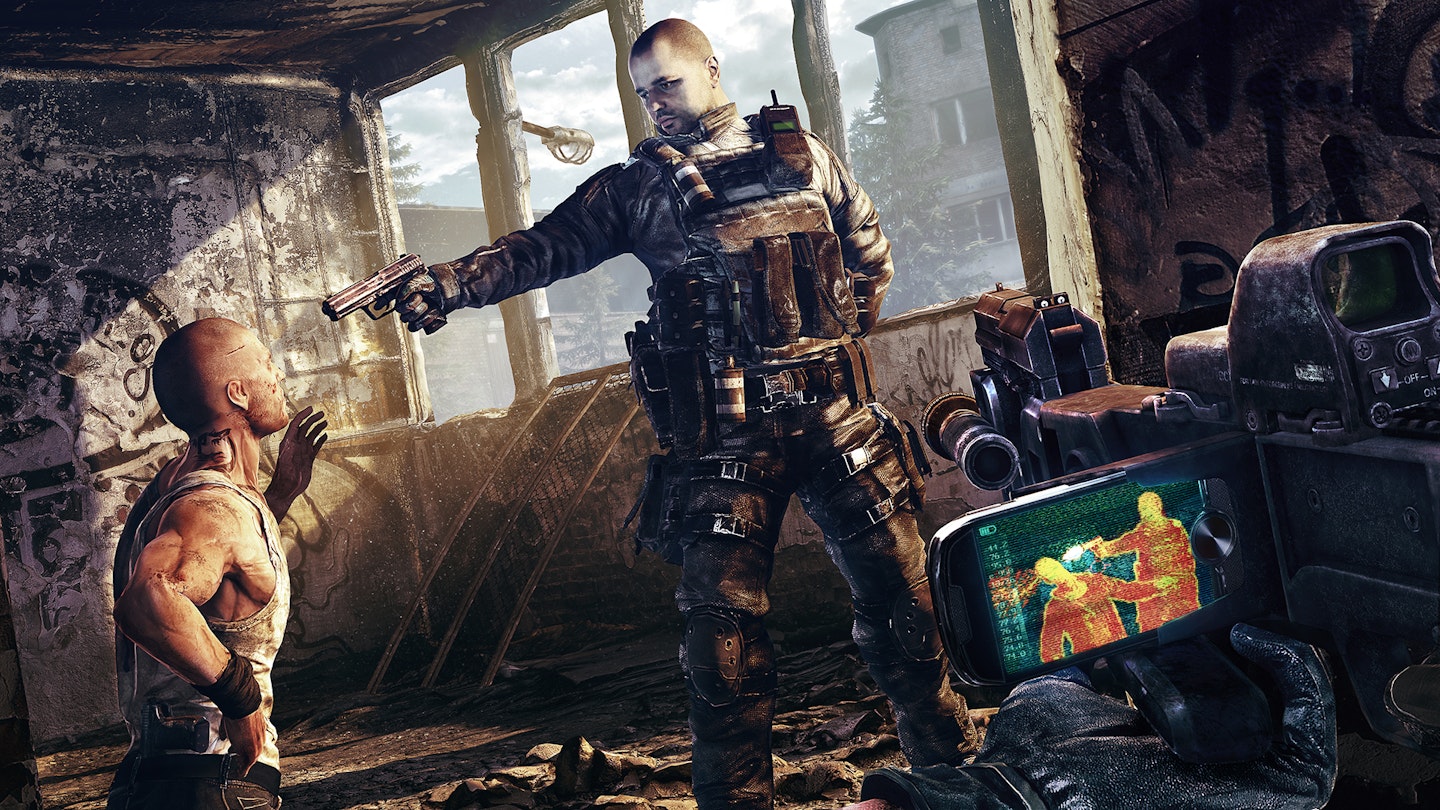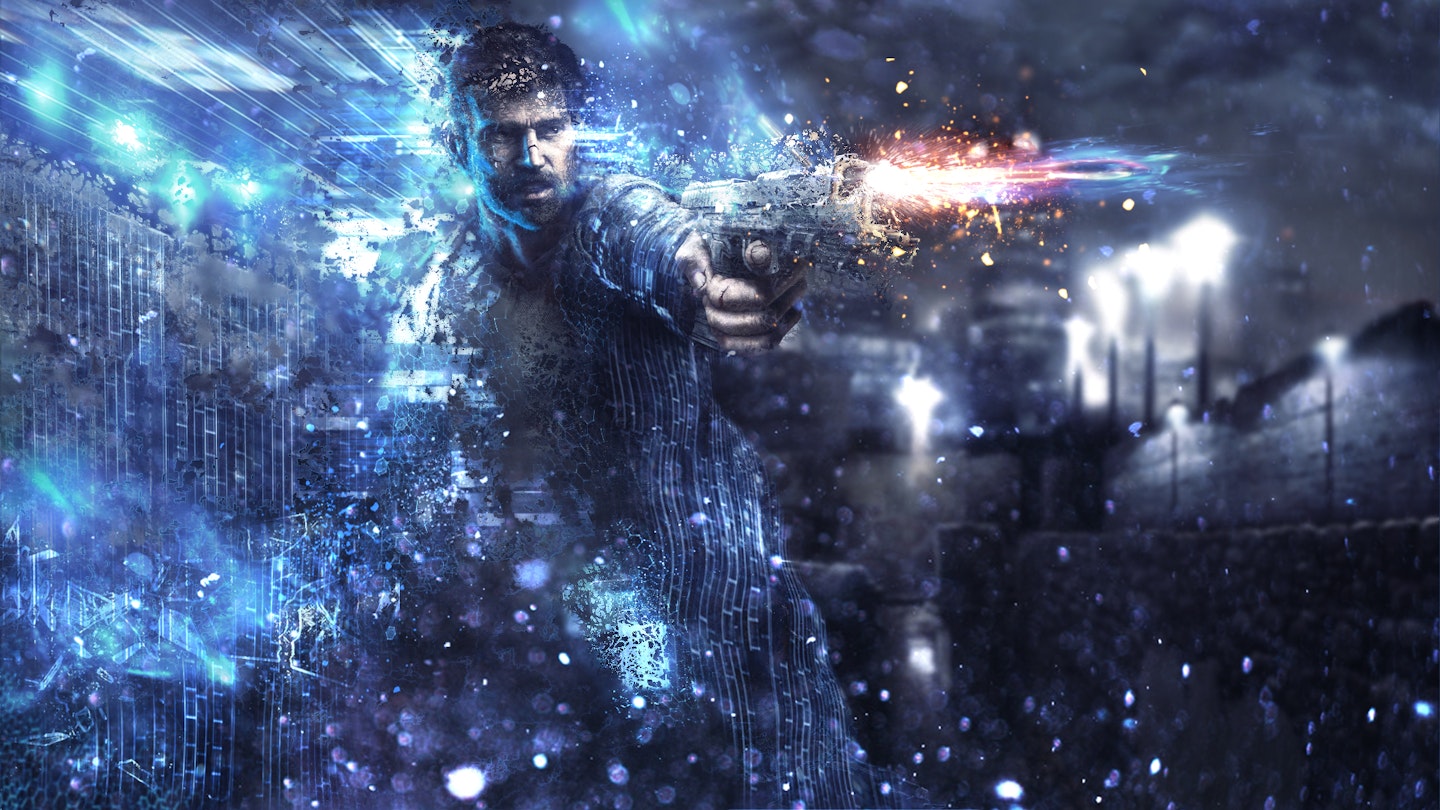Videogames often face accusations of being mindless, repetitive entertainment vehicles that stimulate the reflexes rather than the mind. That view, as anyone who has followed the indie developer scene in recent years will be aware, is thoroughly outmoded. Perhaps it’s occasionally true of the major franchises which make their annual bid to hoover up our cash, but tiny indie developers, without the resources to compete with the big guns, must take a more imaginative and experimental approach. Which is certainly true of Get Even. This is a game that sets out to mess with your mind and succeeds commendably in that aim.
In Get Even, you play Cole Black, a gruff ex-soldier with a murky past now working as a security consultant for a company involved in developing futuristic military hardware. But Black’s first task is to rescue a young woman named Grace who has been kidnapped; Black has tracked her down to an eerie abandoned warehouse in the Midlands.

He’s equipped with a phone containing handy gadgets, including a DNA scanner, a heat-sensing filter, a map which displays any nearby enemies and a UV light. So at first, proceedings feel a bit like a detective game as he tracks her down. Black also has a gun and the ability to perform takedowns, and before long, he reaches the girl. But disaster strikes: he’s unable to prevent the bomb strapped to her from exploding. At which point, things become very freaky.
Next, Black wakes up in a queasily creepy mental asylum to which, he learns from the shadowy warden figure (known only as Mr Red), he has chosen to admit himself. He also learns that he is wearing a headset codenamed Pandora, which has the futuristic ability to recreate memories in virtual reality. In order for Mr Red to let him out, he must investigate what happened to Grace, as well as several other scenarios.

At first, the various missions into which Black is plunged (via photographs of their starting points) seem wildly disparate and unrelated. Gameplay-wise, they vary, too. Black might have to employ stealth as he revisits the theft of a gun which can shoot around corners (something that proves to be very handy indeed), or take a more conventional first-person shooter-style approach. Or he might have to gather evidence using the box of tricks on his phone. Puzzles, often involving opening up previously inaccessible areas, are studded throughout. And there are repeated dream-like sequences in a house that assembles itself when he walks through it, which replay the dysfunctional home life of a man called Robert Ramsey (whose daughter happens to be called Grace).
It’s all very strange, but imperceptibly, the seemingly disparate strands draw together into an overarching whole, and all manner of realisations dawn upon Black. As the Pandora displays elements of glitchiness and Black’s dialogue with Red develops, it becomes clear that the fallibility of human memory is a huge theme for Get Even. And towards the end, the ways in which the mind alters memories to compensate for guilt emerges as a refinement of that theme.

Get Even, in other words, has a way more intellectual agenda than the average game – which it cleverly introduces without ever feeling didactic, but rather via its unusual structure and the varied nature of its missions. The game’s two writers are best known for their work with Derren Brown, and through the medium of a videogame, they have managed to continue their compulsion to mess with our minds very impressively.
A wonderfully eerie soundtrack contributes hugely to the sense of creeping unease that pervades Get Even, and towards the end, you find yourself in sequences that enter full-on survival-horror territory. Yet despite the way the gameplay lurches around, it all feels thoroughly coherent, and makes a twisted form of sense.
As Black continues to discover what happened – at least as far as his memory is concerned – the game builds up to a great climax which, naturally, culminates in a false ending, and the tension ratchets up once again. You come out of the experience emotionally drained but also enlightened, inevitably musing about the nature of human memory, and whether VR that can tap into our minds could actually be a terrible thing. It also provides more than ten hours of gameplay, which is a good innings for an indie title.

Get Even isn’t immune from criticism. It’s such an ambitious game that it’s easy to forget that it was created by a tiny team, so inevitably lacks the visual polish of the sort of blockbusters that vie for the Christmas number one game slot. And some of the later missions seem impossibly hard until you ignore Mr Red’s urgings to take a stealthy approach and get your corner-gun out.
It certainly isn’t a game for the faint-hearted. But if the idea of having your mind messed with appeals, and you fancy gaining some profound, if disturbing, insights into the workings of the human mind, it will be right up your street. Plus, if you’re sick of naysayers telling you that all games are banal, it provides a great means of proving them wrong.
